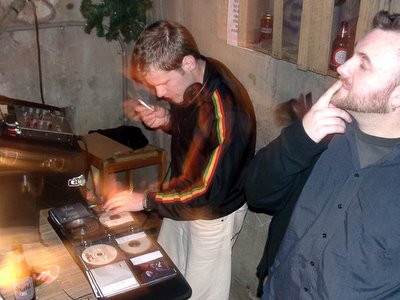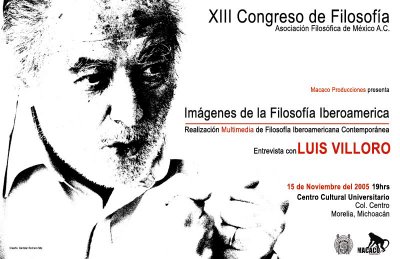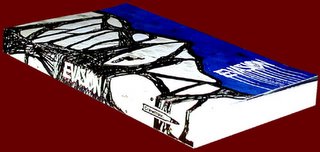If you would like an insight into stereotypical Latin American male-female politics, I’ve translated this little not-politically-correct story, just emailed to me by a self-confessed notorious womanizing Mexican friend of mine:La Cervecita
A couple that married only two weeks ago had the following conversation, because the husband, although feeling happy, already felt like going out on the town, so he said this to his wife:
“My beautiful, I’ve gotta go.”
“Where are you going, darling?” (With the expression of a newlywed).
“To the bar honey, for a little beer.”
The wife puts her hands on her hips and says to him:
“Would like a little beer, my love?” And she opens the door to the fridge to show him 25 brands of beer from 12 countries: Mexican, German, Dutch, Japanese etc
The husband doesn’t know what to do but the first response that pops into his mind is:
“Ay, my divine treasure, but in the bar, you know, the chilled jugs...!”
Before finishing his sentence, his wife interrupts:
“Would you like a frozen jug my love?”
From the freezer she takes out a jug, chilled, frozen, white, so white that it’s almost cracking with cold. The surprised husband says:
“Yes my baby, but in the bar they serve unbelievably good snacks with the drinks, I’ll be right back, ok?”
“Would you like some snacks, my love?”
She opens the oven and the fridge again and pulls out fifteen dishes of different snacks: olives, empanadas, fries, tacos, peanuts, popcorn, cheeses, pate, caviar, cold meats, etc.
“But honey, at the bar, you know, the filthy language, tough words, blokes talking, and all of that…”
“Would like some tough words, my love? Then take the fucking beer, in this jug full of shit and eat the bloody snacks, but you’re not leaving this place you son of a bitch!”
La CervecitaUna pareja que tan solo llevaba dos semanas de casados sostiene él siguiente dialogo, porque el marido, aunque sé sentía feliz, ya andaba con ganas de irse de parranda, así que le dice a su mujer:
“Mi vida, ahorita vengo".
“Adónde vas, cariño?" (Expresión de recién casados).
“Al bar mi cielito, a tomarme una cervecita".
La mujer se lleva la mano a la cintura y le dice:
“Quiere cervecita, mi amorcito?" Y en eso abre la puerta de la nevera y le enseña 25 marcas de cerveza de 12 países diferentes: mexicanas, alemanas, holandesas, japonesas, etc.
El marido no sabe que hacer y se le ocurre decirle:
“Ay, mi gorda divina, pero en el bar, tu sabes, la jarra helada...!"
No terminaba de decir esto, cuando la esposa interrumpe diciéndole:
“Quiere jarra congelada mi amorcito?"
Saca del congelador una jarra helada,congelada, blanca, tan blanca que hasta temblaba de frió. El marido sorprendido dice:
"Si bebita mía, pero en el bar sirven unas Botanas riquísimas, vuelvo enseguida, Si?"
“Quiere Botanas, mi amorcito?"
Abre el horno y la nevera y saca quince platos diferentes de Botanas: aceitunas, empanadas, papas fritas, tacos, cacahuates, palomitas,quesos, paté, caviar, carnes frías, etc.
“Pero caramelito, en el bar, tu sabes, las maldiciones, las palabrotas y todo aquello..."
“Quiere palabrotas, mi amorcito? Entonces: ¡Te tomas la puta cerveza, en esa jarra de mierda y te comes esas malparidas Botanas, pero de aquí no sales, hijueputa!”
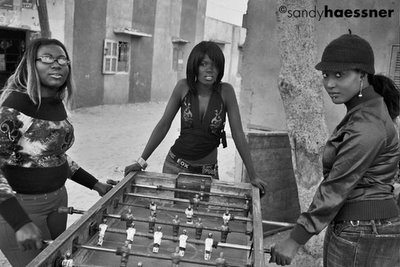 On the road in an unfamiliar corner of the world, how do you walk into a raucous crowd yelling a language of which you don't understand a word, and make an immediate lasting and friendly impression? The World Game. Whether playing with barefeet kids on remote tropical beaches; kicking a fluorescent Finish ball in the snow; juggling a ball at a Lombok bus stop or being invited to join a tournament in remote Indonesia - I can only speak of positive experiences. Even playing table soccer with non-athletes or discussing politics with Mexican punks selling "Football Is The Opiate Of The Masses" stickers.
On the road in an unfamiliar corner of the world, how do you walk into a raucous crowd yelling a language of which you don't understand a word, and make an immediate lasting and friendly impression? The World Game. Whether playing with barefeet kids on remote tropical beaches; kicking a fluorescent Finish ball in the snow; juggling a ball at a Lombok bus stop or being invited to join a tournament in remote Indonesia - I can only speak of positive experiences. Even playing table soccer with non-athletes or discussing politics with Mexican punks selling "Football Is The Opiate Of The Masses" stickers.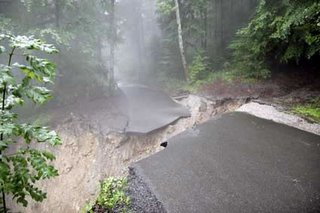

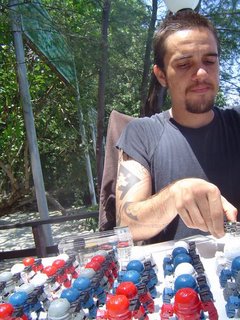
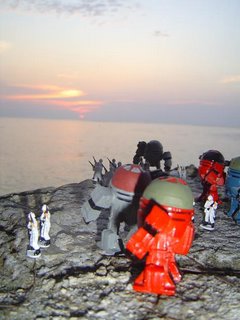
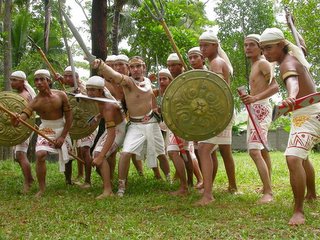 My latest action-horror flick will hit the Indo cinemas at the end of the year if the Executives don't request yet ANOTHER revision from the special effects department...all those explosions cost a bomb... haha get it, explosions - cost...a...bomb...oh nevermind...and the motorcylce is STILL being built.
My latest action-horror flick will hit the Indo cinemas at the end of the year if the Executives don't request yet ANOTHER revision from the special effects department...all those explosions cost a bomb... haha get it, explosions - cost...a...bomb...oh nevermind...and the motorcylce is STILL being built.
